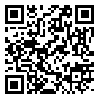

Volume 13, Issue 3 (12-2015)
RBS 2015, 13(3): 359-366 |
Back to browse issues page
Download citation:
BibTeX | RIS | EndNote | Medlars | ProCite | Reference Manager | RefWorks
Send citation to:



BibTeX | RIS | EndNote | Medlars | ProCite | Reference Manager | RefWorks
Send citation to:
طوقيان چهارسوقي ا, زاده محمدي ع. The effect of miniature learning on self-efficacy of learning disability children in Yousef-Abad Clinic, Tehran. RBS 2015; 13 (3) :359-366
URL: http://rbs.mui.ac.ir/article-1-424-en.html
URL: http://rbs.mui.ac.ir/article-1-424-en.html
Abstract: (1868 Views)
Abstract Aim and Background:: Self-efficacy is an important research in students with learning disability. Because of multiple failures of children with nonverbal learning disability, they have low self-esteem and missed their abilities, so the aim of the present study was to explore the effect of study of miniature on self-efficacy of children with nonverbal learning disability (NLD). Methods and Materials: This is an experimental study (pre-test, post-test) with the control group which was conducted during 2 months. 20 children (10 boys and 10 girls) with NLD were selected from 60 children in Peyvand psychological clinic and Yousef Abad center and randomly was implementing in experimental and control groups. The average age of the girls in the experimental group was 10/33 and in the control group was 9/30 and the average of age of boys in the experimental group was 9 and in the control group was 10. The experimental group took part in ten sessions of miniature with 45-60 min, while the control group was put on a waiting list. Both groups received the Sherer self-efficacy test tow times (pre-test and post-test) during 4 weeks. Sherer test is a valid and relaibale questionnaire with 17 items likert scale (Coronbach alpha coefficient for farsi version =0.79). Findings of this study were analysed by ANCOVA based on repeated measure using SPSS version 20. Findings: The results revealed that Persian miniature had a significant effect on self-efficacy (P≤0.05). Conclusions The findings of this study showed that simplify and enhance of paintings were effective in raising of self-efficacy of children with learning disabilities, so it could be a good technique for NLD children and suggested for them. Further studies with control group and greater sample size are warranted to evaluate the efficacy of art therapy for NLD clients.
| Rights and permissions | |
 |
This work is licensed under a Creative Commons Attribution-NonCommercial 4.0 International License. |



